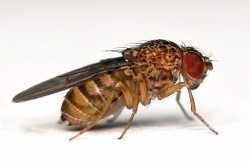25 Feb Fruit Flies Can Serve As Model For Screening Cancer Drugs
MedicalResearch.com Interview with:
Ross Cagan, PhD
Professor, Developmental and Regenerative Biology, Oncological Sciences, Ophthalmology
Senior Associate Dean for the Graduate School of Biomedical Sciences
Icahn School of Medicine at Mount Sinai
Medical Research: What is the background for this study? What are the main findings?
Dr. Cagan: Large scale screening for new cancer drugs typically rely on either cell culture or biochemical assays. These types of systems do not take into account the complexity of cancer and drug interactions at a whole animal level. We developed a whole animal screening method using Drosophila (fruit flies) as a model organism. Our model activates the Ras and PI3K oncogenic pathways specifically in lung-like Drosophila tissue. The end result is overproliferation, cell migration and animal lethality. These phenotypes were used to screen a large library of drugs, from which a number of hits were discovered. This study focused on the synergistic abilities of the Mek-inhibitor, trametinib, and a statin to rescue the cancerous phenotypes at a molecular, cellular and whole animal level.
Medical Research: What should clinicians and patients take away from your report?
Dr. Cagan: The ‘small scope’ take-away from this study is the potential statins have as anti-cancer drugs. This report shows that statins are capable of tamping down the oncogenic PI3K pathway, which supports previous studies. Perhaps more interesting are the results showing statins’ ability to rescue the toxicity of many other drugs, including trametinib. Statins are generally thought of as cholesterol lowering drugs. Fruit flies, however lack the enzymes necessary for cholesterol synthesis. The results from this study suggest that statins’ anti-cancer effects are due to their role in post-translational modification of signalling molecules such as Ras.
The ‘large scope’ take-away is the potential of using fruit flies as a model system to screen for cancer drugs.
Besides the previously mentioned whole animal advantages, fruit flies are also a very sophisticated genetic model that allows researchers to manipulate multiple genes. This is important given the large number of genetic mutations found in most human tumors.
Medical Research: What recommendations do you have for future research as a result of this study?
Dr. Cagan: This report shows advantages of using a whole animal model in cancer drug screening. One of the key observations from this study was the ability of a statin to rescue toxicity of other drugs. In vitro screening—for example in cell lines— likely would not have uncovered this subtlety in statins interactions with other drugs. Statins are one of the most widely used drugs in the world and new, retrospective observations are showing the therapeutic anti-cancer value of statins. Future research should include more pre-clinical exploration of the effects statins have in cancer models when combined with other drugs. Additionally there is likely a wealth of retrospective data on cancer patients receiving statins that has yet to be properly analyzed.
Medical Research: Is there anything else you would like to add?
Dr. Cagan: Cancer is a complex disease, and a growing number of laboratories are looking to treat it with drug cocktails vs. single drugs. Drosophila provides an opportunity to find new classes of drug combinations that account for the disease in the context of the whole animal.
Citation:
Cell Rep. 2016 Feb 16;14(6):1477-87. doi: 10.1016/j.celrep.2015.12.105. Epub 2016 Jan 28.
Drosophila Lung Cancer Models Identify Trametinib plus Statin as Candidate Therapeutic.
Levine BD1, Cagan RL2.
http://www.ncbi.nlm.nih.gov/pubmed/26832408
[wysija_form id=”5″]
Ross Cagan, PhD (2016). Fruit Flies Can Serve As Model To Screen For Cancer Drugs
Last Updated on February 25, 2016 by Marie Benz MD FAAD


